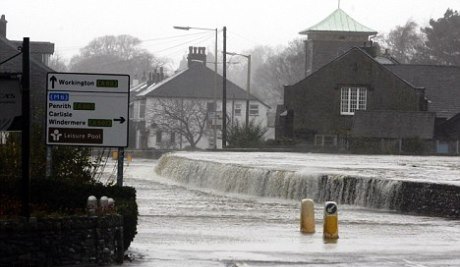It's been a wet winter.
Due to climate warming? Maybe. Some say so.
Due to human-caused climate change? Maybe. Maybe not.
Has it rained before in winter? Yep
Have the rivers flooded before? Yes
Have they flooded to such extremes before? Yes.
As a Guardian reading, Green voting archaeology graduate my sensibilities naturally lean towards the 'we're all going to hell in a handcart' variety of environmental opinions. The basis for these ideas however is a little shaky.
I could definitely point to decreasing numbers of birds and insects as proof of environmental impoverishment. But I'm guessing this is due to pollution and neglect, rather than the amount of carbon in the air. Whether manmade climate change is a distant cause of the extreme flood events of recent years I cannot say for certain. The physics and mathematical models used to explain this relationship are too complex for me to understand. It becomes a matter of faith and world view. Scientists would hotly deny it, but for most people agreement with scientific explanations of anything must be a matter of belief and trust, not complete understanding. It works in a similar way to religion. The educated Latin-reading, logarithm-juggling priests tell me this is the way the world works, and if that doesn't sound too outrageous I'll meekly go along with their pronouncements.
To counter this inevitable passivity I try to look to what I know for certain. The empirical scientific approach if you like.
Does it rain in winter?
Do rivers flood in winter?
I realise it is a moot point to those whose houses have flooded, but for us without the fear I think it is worth remembering that all the rivers that surround us are not flowing as they would like. Rivers as we experience them now are all shaped by human activity. This is most evident in towns and cities. Our dear old Mersey is severely canalised and even disappears below Stockport's main shopping street. But it is also true of rural rivers. They flow through agricultural land that is managed. Riverbeds are dredged. Banks are worn by livestock, or reinforced with crates of rocks.
 |
| Thames in 1817 before embankment |
That a flood is deemed disastrous is a reflection on the degree to which a landscape is populated by people. A flood is not disastrous if people aren't in its way. It is merely a natural seasonal event. A river that meanders through its floodplain unhindered by human activity will overflow its banks out onto the surrounding land in response to increased water input from its catchment area, and no one need shriek
In reading around this subject I found a blog by a Phd student about 'flooding, community and resilience': herecomestheflood. I really recommend it if you would like an unemotional discussion of these events.'what's the government doing?',
'we need to stop burning fossil fuel',
'it's never been like this before'.
One topic he writes about is the public's understanding of flood risk terms. A once in a hundred years flood is not one that will happen once in a hundred years, but one that has 1% chance of happening every year. Worth thinking about. There is more detail in this post: My Long Read: Understanding floods – how big, how often, and how should we defend?
I'll let this scientist have the final word:
This isn’t an act of god, it isn’t the Environment Agency’s fault, it’s simply what happens when you mix society and nature.
